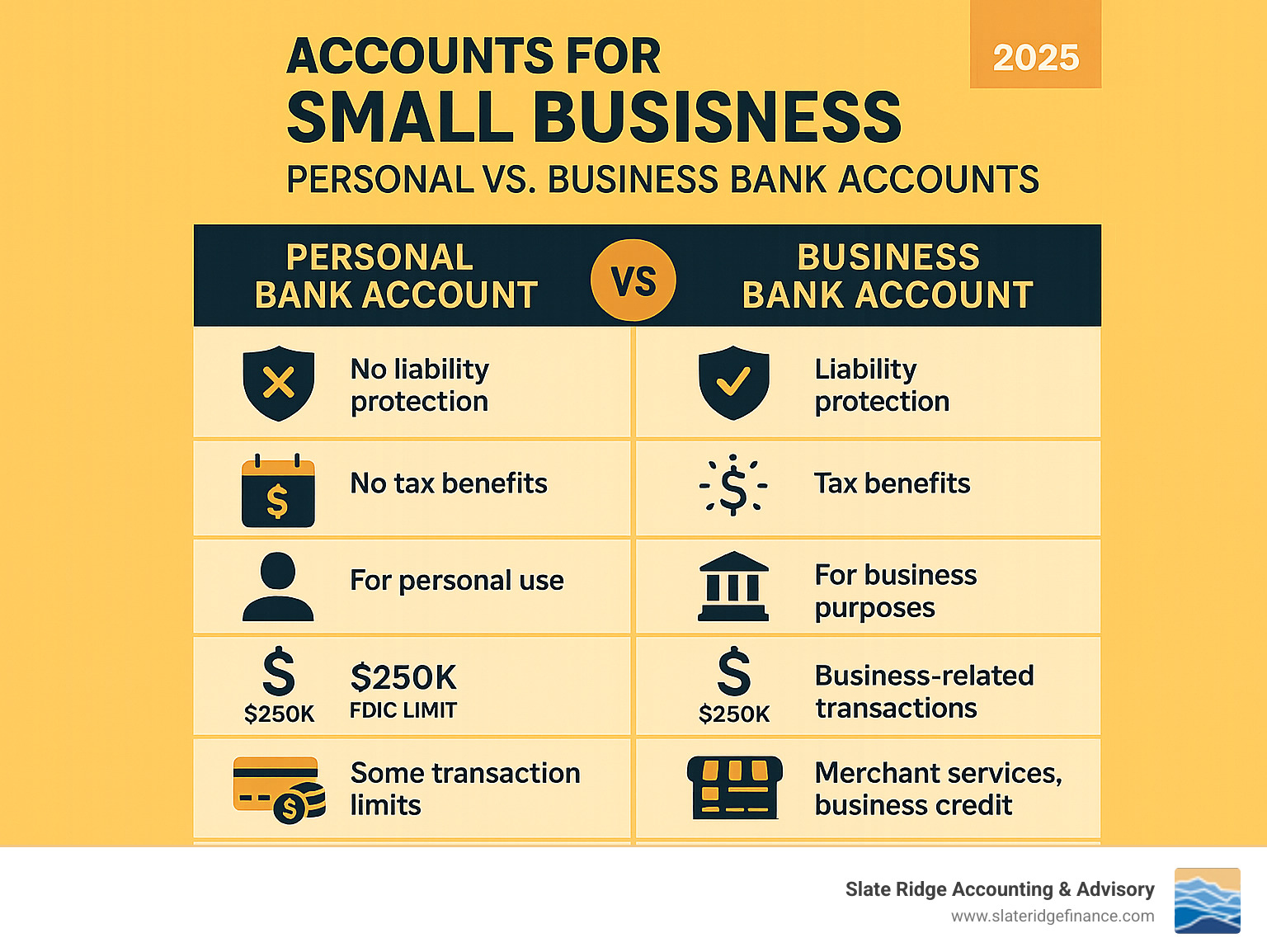Why the Right Accounts for Small Business Matter More Than You Think
Accounts for small business are the foundation of your financial health. The right banking setup from day one can be the difference between success and struggle.
Essential Small Business Account Types:
- Business Checking Account - For daily transactions.
- Business Savings Account - For emergency funds and reserves.
- Business Credit Line - For managing cash flow gaps.
- Merchant Services Account - For accepting customer payments.
Key Benefits of Separate Business Accounts:
- Legal protection for personal assets.
- Simplified tax preparation and bookkeeping.
- Professional credibility with customers and vendors.
- Access to business-specific banking services.
- FDIC insurance protection up to $250,000.
As one owner noted, separating accounts limits personal liability, simplifies employee banking authorization, and streamlines tax recordkeeping.
The banking landscape has evolved. Online banks may offer 2.50% interest rates with no monthly fees, while traditional banks provide branch networks. Accounts can range from no-fee options with a $2,000 minimum balance to premium accounts at $125 monthly for unlimited transactions.
Understanding your options can save thousands in fees and open up growth opportunities, whether you're a new sole proprietor or an established corporation.

Choosing the Right Account: Foundations of Financial Management
Choosing the right accounts for small business is foundational. The right financial ecosystem will support your growth, while the wrong one will create obstacles. It's more than just a place to park money.

The competitive banking landscape is great for business owners. Online banks may offer 2.50% interest rates with no monthly fees, while traditional banks provide branch networks. Some accounts waive fees with a $2,000 minimum balance, while premium accounts might cost $125 monthly for unlimited transactions.
The key is understanding what your business actually needs.
Essential Features of Accounts for Small Business
When shopping for accounts for small business, consider your daily operational needs.
Monthly fees should be a primary concern. Look for accounts with no monthly fees or waivers for maintaining a minimum balance (e.g., $2,000). Ensure the balance requirement doesn't restrict your operational cash flow.
Transaction limits are critical. Avoid expensive overage fees by choosing an account with limits that match your volume, or one that offers unlimited transactions.
Mobile and online banking is a must. It should allow you to check balances, pay bills, transfer funds, deposit checks via camera, and integrate with accounting software.
ATM access is important if you need cash. Some banks refund all ATM fees, while others have limited networks. Choose based on your expected usage.
Integration with accounting software like QuickBooks or Xero automates bookkeeping and reduces errors.
Overdraft protection acts as a safety net to prevent declined payments when funds are temporarily low.
Merchant services from your bank can simplify setup and reduce fees if you accept credit cards.
Online-Only vs. In-Person Banking
The choice between online and traditional banking depends on your preferences for managing money and relationships.
Online-only banks often provide higher interest rates (1.50% to 2.50%), zero monthly fees, and unlimited transactions. With a superior digital experience and robust mobile apps, they are ideal for tech-savvy owners who don't handle much cash.
The main limitation of online banks is cash deposits, which can be inconvenient. This is a significant drawback for businesses that handle a lot of cash.
Traditional banks excel at in-person service and relationship building, which is valuable for complex needs or loan applications. They handle cash deposits and cashier's checks seamlessly and may offer more integrated services like payroll. The trade-offs are typically higher monthly fees and lower interest rates.
Consider your business habits when choosing. Do you handle cash? Prefer in-person support? Want to maximize interest? A hybrid approach, using both an online and a traditional account, can offer the best of both worlds. Match your banking setup to your business operations.
Opening Your Account & Understanding the Rules
Opening accounts for small business is a straightforward process if you're prepared. Your business structure determines the required documents and how your deposits are protected. The bank simply needs to verify your identity, your business's legal status, and your authority to open the account.

Documentation Needed by Business Structure
The paperwork you'll need depends on your business's legal structure. Pro tip: Call the bank beforehand to confirm their specific document requirements to avoid a wasted trip.
Sole proprietorships: As the simplest structure, you'll need a government-issued photo ID and your Social Security Number (or EIN if you have employees). If you use a trade name, bring your DBA certificate and any required business licenses.
Corporations: As separate legal entities, corporations need an EIN, Articles of Incorporation, and Corporate Bylaws. You must also provide a Corporate Resolution authorizing the account opening. All authorized signers will need a government-issued photo ID.
Partnerships: You will need an EIN, your Partnership Agreement, and a DBA certificate if using an assumed name. All general partners and authorized signers must provide a government-issued photo ID.
Associations and non-profits: Provide your EIN, Articles of Association, and bylaws. You'll also need Meeting Minutes or a Resolution authorizing the account and identifying signers. For tax-exempt status, bring your 501(c)(3) letter from the IRS.
Protecting Your Deposits: How Deposit Insurance Works
A key benefit of dedicated accounts for small business is FDIC insurance. Deposits are insured up to $250,000 per depositor, per bank, for each ownership category. How this applies depends on your business structure.
Corporations and partnerships: As separate legal entities, their deposits are insured separately from the owners' personal accounts. This means a business with $250,000 and an owner with $250,000 at the same bank are both fully insured.
Sole proprietorships: Since a sole proprietorship is not a separate legal entity, its business and personal deposits at the same bank are combined under a single $250,000 FDIC limit. For example, $150,000 in a business account and $150,000 in a personal account would have $50,000 uninsured.
This is a hidden reason many business owners eventually incorporate or form an LLC. The FDIC Electronic Deposit Insurance Estimator at https://edie.fdic.gov/index.html can help you determine your coverage. For more guidance on managing your business finances, check out our Professional Services Accounting services.
Understanding the Different Types of Accounts for Small Business
Properly managing your accounts for small business goes beyond the basics. It involves choosing the right accounting method, using technology, and setting up systems for clarity and control.
Choosing an Accounting Method: Cash vs. Accrual
A key decision is choosing between cash and accrual accounting. This choice, permitted by the IRS, affects how you record income and expenses, impacting your financial statements and taxes.
| Feature | Cash Accounting | Accrual Accounting |
|---|---|---|
| When Income is Recorded | When cash is received. | When income is earned. |
| When Expenses are Recorded | When cash is paid out. | When expenses are incurred. |
| Financial Picture | Shows actual cash on hand. | Provides a more accurate picture of financial performance. |
| Complexity | Simpler, easier for small businesses. | More complex, requires tracking receivables/payables. |
| Tax Implications | Income taxed when received. | Income taxed when earned. |
| IRS Requirement | Generally for businesses with <$29M annual gross receipts. | Required for businesses with inventory or >$29M annual gross receipts. |
- Impact on Financial Records: Cash accounting shows your current cash balance. Accrual accounting gives a truer picture of profitability by matching revenues to the expenses incurred to earn them.
- Tax Implications: The cash method simplifies taxes by reporting income only when received. Accrual accounting can offer tax advantages by allowing for deferred income or accelerated deductions.
- When to Choose Each Method: The cash method is best for small, service-based businesses. Accrual is better for growing businesses with inventory or those offering credit. To change methods, file IRS Form 3115.
For a deeper dive, visit our page on Small Business Accounting Services.
Best Practices for Managing Accounts for Small Business
Having the right accounts is the first step; effective management open ups their potential. Follow these best practices to keep your finances in order:
- Maintaining Accurate Records: Record every transaction. Accurate records with proper documentation (receipts, etc.) are crucial for tax preparation and informed decision-making.
- Regular Bank Reconciliation: Monthly, compare your bank statements to your internal records. This process catches errors and ensures your books accurately reflect your cash position.
- Using Accounting Software: Use software like Xero to automate bookkeeping, sync accounts, track expenses, and generate financial statements. It saves time, reduces errors, and provides real-time financial insights.
- Managing Accounts Receivable: To maintain healthy cash flow, regularly monitor accounts receivable and follow up on overdue invoices. Offering early payment discounts can also encourage prompt payment.
- Effective Cash Flow Strategies: Cash flow is vital. Manage it by monitoring receivables and payables, creating a cash flow forecast, maintaining a cash reserve, managing inventory efficiently, and using accounting software for real-time insights.
By implementing these best practices, your accounts for small business can actively contribute to your success. Learn more by reading about 3 Bookkeeping Myths That Could Be Costing You Money.
Leveraging Your Account for Growth: Financing and Retirement
Your accounts for small business are powerful tools for growth and securing your future. A well-managed account creates a financial foundation that opens doors to funding and long-term wealth. Lenders view your banking history as a financial resume, assessing your business's health and reliability.
Securing a Business Loan
Most small businesses eventually need extra capital. A solid banking history with your accounts for small business puts you in a stronger position to secure it.
Your business plan is your roadmap to approval. Your plan must detail your business model, customers, and revenue strategy. Well-maintained accounts provide the historical data needed to support your financial projections.
What catches a lender's attention? Lenders review your business plan, credit history (personal and business), cash flow, and available collateral. Industry experience and a clear purpose for the loan are also critical.
Choosing between lines of credit and term loans depends on your needs. A business line of credit is a flexible, reusable fund ideal for managing cash flow or unexpected costs. A term loan provides a lump sum for large, one-time purchases like equipment, which you repay over a set period.
The Small Business Administration offers guaranteed loan programs, including a microloan program for up to $50,000. You can find helpful tools to create a business plan on their website.
If you're in the Raleigh area, our specialized Raleigh NC Accounting services can help prepare your financials for a loan application.
Retirement Plans for Small Business Owners
Many business owners neglect retirement planning. Setting up a plan not only secures your own future but also serves as a powerful tool for attracting and retaining talented employees.
The key is finding low-cost investment options with low expense ratios so more of your money can grow.
SEP IRAs are simple, employer-funded plans with tax-deductible contributions that can be adjusted annually. They are ideal for sole proprietors and small businesses.
SIMPLE IRAs allow contributions from both employers and employees, making them a good alternative to a 401(k). They are relatively easy to manage.
Solo 401(k)s are a powerful option for owners with no employees (besides a spouse), allowing contributions as both "employee" and "employer" for higher potential limits.
The right choice depends on your business size and contribution goals. You can learn more about small business retirement plans and explore specific investment options.
Your accounts for small business are the foundation for these growth opportunities. Keep them healthy to build the business and future you envision.
Frequently Asked Questions about Small Business Accounts
Managing accounts for small business can be complex. Here are answers to the most common questions we hear from business owners.
What are the main benefits of separating business and personal finances?
Separating finances is crucial for several reasons. Liability protection is key; for LLCs or corporations, mixing funds can "pierce the corporate veil," making you personally liable for business debts. It also creates simplified record-keeping for easier tax preparation. Finally, it improves professionalism with clients and vendors and allows you to build business credit separate from your personal score, which is vital for future financing.
When should a small business consider outsourcing its accounting?
Consider outsourcing your accounting in these situations:
- When it's too time-consuming: If bookkeeping distracts you from core business activities, it's time to delegate.
- During rapid growth: Growth brings complexity in payroll, sales tax, and inventory that experts can manage.
- For financial strategy: An accounting partner provides forecasting and strategic insights beyond simple record-keeping.
- To ensure tax compliance: Professionals stay current on changing tax laws, ensuring compliance and maximizing deductions.
How can a small business effectively manage its cash flow?
Effective cash flow management requires ongoing attention. Key strategies include:
- Monitoring accounts receivable and payable: Diligently track who owes you money and follow up on late invoices. Manage your own payments strategically.
- Creating a cash flow forecast: Use historical data to project future income and expenses, helping you anticipate cash shortages.
- Maintaining a cash reserve: Keep three to six months of operating expenses in a reserve fund for emergencies.
- Using accounting software: Leverage software for real-time visibility into your cash position, allowing for quick adjustments.
Conclusion
Establishing the right accounts for small business is a foundational step that simplifies every other aspect of your enterprise. We've covered the essentials: choosing the right accounts, understanding legal requirements like FDIC insurance, and leveraging your banking for growth through financing and retirement planning.
A solid financial foundation provides clarity, reduces stress, and empowers confident decision-making. Every choice, from the type of account you open to a loan application, contributes to your long-term financial health.
Managing business finances can be complex, but it doesn't have to slow you down. Slate Ridge Accounting & Advisory offers expert guidance with modern, personalized solutions. We provide virtual bookkeeping, financial clean-up, and advisory services across North Carolina, from Asheville to Wilmington, helping you track key KPIs and forecast growth.
Our cloud-based approach lets you focus on your business, not on spreadsheets. We provide expert support without the hassle of traditional accounting.
Ready to turn financial management into a competitive advantage? Get started with our Virtual Accounting Services and find how much easier running your business can be.
Ready to get started?
Book a free consultation today and let’s explore how Slate Ridge can support your business with expert accounting that’s accurate, timely, and built around your goals.






